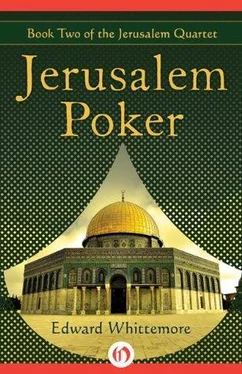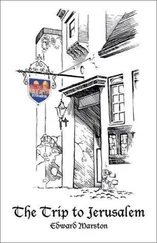And so given these vast implausibilities, geographical and racial and religious and esthetic, it immediately becomes apparent that much more than just the faith of my fathers is involved. Quite obviously, someone with an extraordinary overview has taken a hand in the matter and given me faith in this task.
Maud reached out and tweaked his nose.
It's always useful to have that kind of help, she said. The only thing you haven't explained is why these Japanese twins happen to figure so prominently in God's plan?
But that's easy, said Munk, tapping her nose in turn. The Japanese are a unique people who arrived in their islands more or less as an entity, with a culture of their own, just before and after the time of Christ.
But no one has ever been quite sure where they came from. Now it was suggested more than once in the last century, by them of course, when they'd opened up their country and begun to Westernize themselves, that they just might be the survivors of the ten lost tribes of Israel. No one has ever taken that seriously but the time span wouldn't have to be wrong if you consider a leisurely journey across Asia, with time out to plant crops and care for livestock as a wandering people must, and also with time out to develop their unique culture, so they'll definitely be an Asian people when they eventually arrive in their Asian islands. And lastly, I don't think I mentioned that both Baron Kikuchi and his twin, Rabbi Lotmann, are very small men with very short legs. Legs that short, if not in a hurry, would cover distances sparingly and take some centuries to cross the world's largest continent from its western end to its eastern tip. So in conclusion, God's plan for the last two and half millennia has been to have His chosen people stationed at both extremities of Asia to see that nothing untoward occurs in the interior, which as we know has been a notorious birthplace for marauding tyrants throughout history. And those are the facts, in brief.
Well what do you think?
Maud smiled and filled both their glasses. She raised hers in a toast.
Chapeau, Munk.
Thank you, madame.
Before she moved to Athens in September, Maud saw the changes in Theresa. She couldn't believe it was really as bad as it appeared but in fact it was worse, as Sivi told her the next time they met, in Athens late in the spring of the following year.
She's coming apart, said the old man sadly. She just doesn't care about anything. Drugs and alcohol and practically any man who speaks to her on the street. She told me there were thirty-five last month and she didn't even know the names of most of them. Then she laughed and said they all had beards though.
Beards?
Yes, it's crazy. I don't know what that was supposed to mean, or whether it meant anything at all. But I didn't like the way she said it and that laugh was more a scream of desperation, just horrible to hear. But she won't let me help her, she says it's not my concern and there's nothing I can do. Well if it's not my concern, whose can it be? She doesn't have anyone else. Oh I tell you, Maud, I feel sick about it. It simply can't go on like this much longer. There has to be an end in sight or it will be all over for her. And she's so young, just a child.
Maud took his hand and agreed with him, not knowing the end was indeed in sight because a gunrunner named Stern, the man in Jerusalem who had told Munk where he could find Rabbi Lotmann, had recently arranged for O'Sullivan Beare to meet Sivi in Smyrna in September.
Sivi providing arms for Stern and Joe smuggling them. Sivi a secret patriot with his dreams of a greater Greece, his clandestine life unknown to Maud then and for many years. And Stern, the sad shabby gunrunner who would save Maud's life more than a decade later when she stood in despair beside the Bosporus in the rain, ready to give it all up at last, the past too much for her, ready to throw herself into the currents when night came.
Sivi, Theresa, Stern, Joe. Only a few months from then to be together in Smyrna when a raging massacre would break loose and change all their lives.
Leaving Stern a tormented man forever. Driving gentle Sivi into madness. Theresa's tortured visions in the fire and smoke of that terrible slaughter to be revealed so painfully to Joe when their time came, on the small lonely rooftop where he kept watch in the Old City.
Smyrna and Jerusalem. The profane and sacred cities one day to be inextricably entwined in Maud's memories.
— 13-
O'Sullivan Beare
Signal night, he thought, quiet place for sure. Demanding night up here beneath the murmurs of heaven.
And there were other, quieter moments during the twelve-year poker game when one of the three friends would disappear for days or weeks to pursue his dream. Munk Szondi building a future Jewish homeland, Cairo Martyr on his quest for the black meteorite of Islam, O'Sullivan Beare pondering the enigmas of the lost Sinai Bible and his lost love as well, Maud, the woman who had abandoned him in Jericho in 1921, taking with her their infant son.
When those moods came over him Joe left Jerusalem and traveled down to Galilee where he kept his tiny seaplane, a Sopwith Camel.
Joe had won the Camel in a poker game during the great blizzard of '29. That spring he learned to fly the Camel and had a hangar built for it on the shores of the lake, and his first flight that spring became the pattern for all the subsequent ones.
Late in the evening he taxied out onto the still water. He pushed the engine to full power and the Camel broke free to rise above what had once been Beth Jarah or the Temple of the Moon, sped south above the Jordan down the sinking valley past Naharaim and Bethshean and Jabesh-gilead, past Jabbok and Adam and the Jungle of the Jordan where lions had once roared, above the little flowered house somewhere below that he and Maud had once known near Jericho, whose ancient name also spoke of a lunar god, between the Moabite hills and the Dead Sea along the slopes of Mt Nebo where Moses had seen the promised land that he would never enter, rising to speed above the wastes and reaching Aqaba, tracing the west coast of the gulf until the configuration of a promontory and a mountain told him the Sinai oasis was coming up beneath him.
There Joe landed the Camel and pulled it partway up on the sand. He took ashore a small wicker basket and a bottle marked with the cross of St John, dated A.D. 1122, and sat crosslegged under a palm tree eating fresh figs and drinking raw poteen, waiting for the last hours of night to pass and the sun's rays to rise above the mountains of Arabia, to warm the sands and glitter upon the waters where he had long ago spent a month with Maud.
Once he had a strange visitor in that remote spot, and the episode was so curious he wondered later if it might not have been a dream, a vision brought on by poteen and the dark loneliness of his mood.
In the very first light he had seen the figure, small and indistinct, coming out of the Sinai and moving in his direction. The minutes passed and the figure became an Arab, still striding directly toward him. He remembered being puzzled that the Arab had known he was there in the darkness, so complete in that last moonless hour before dawn that even the plane would have been invisible to anyone more than a few hundred yards away. Yet from the time he first saw the Arab, the man's line of march had never changed.
He came walking straight from the night toward Joe, straight from the vast black hills of the desert to the mound where Joe sat on the beach.
A gray light now lay on the sand. The Arab kept coming until he was no more than ten yards away, then stopped and smiled. The stave he carried was that of a shepherd. His cloak was tattered and he was barefoot, his head tied with an old rag, a poor man of indistinct age. Gesturing, smiling, he made friendly signs that Joe was to follow him.
Читать дальше












